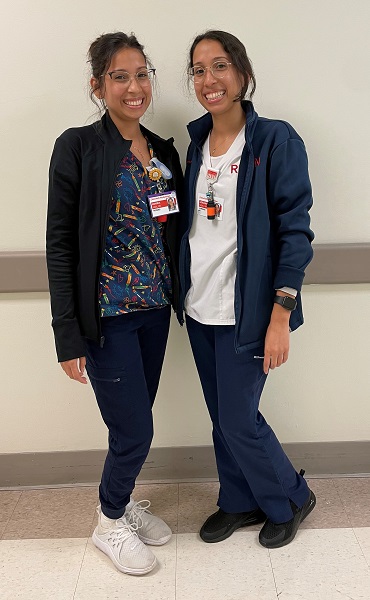Sisters Share Twin Success Stories
May 6, 2022
 As with many health professions, the key to a successful and rewarding nursing career is connection, and Adriana and Amanda Vidal were born with a very special one. They are twins.
As with many health professions, the key to a successful and rewarding nursing career is connection, and Adriana and Amanda Vidal were born with a very special one. They are twins.
Growing up in Teaneck, NJ, the Vidal sisters did many activities together like rowing on the crew team and volunteering at a local hospital in high school. Both these endeavors were influential as nursing students and deciding to participate in extracurricular activities.
Drexel University popped up on their radar while spending time in Philadelphia for weekend races on the Schuylkill River. As they researched nursing programs and universities, it was Drexel’s co-op program at the College of Nursing and Health Professions (CNHP) that caught their attention, but it was meeting the student ambassadors during their visit that put them over the top. They were impressed by the students’ experiences and their enthusiasm about how dedicated and supportive the faculty members had been in their academic careers. “We knew this was our school after talking to these students,” Amanda commented. This interaction was so memorable for the twins that they, themselves, became student ambassadors to help recruit new students.
As Adriana and Amanda progressed through the BSN program, they encountered some challenges with their Pharmacology I, MedSurg I courses in their sophomore year, and sought support from assistant clinical professors Meghan Shattuck, MSN, and Danielle Devine, PhD . And during their senior year, Maureen Gonzales, MSN, assistant clinical professor who specializes in women's health supported the sisters. Adriana recalls one particular time when it took their professor just seconds to respond when she reached out. “The professor eagerly met with us. They definitely pushed us to keep going and to strive to become the nurses that we are today."
The BSN Co-op program is something for which Drexel is well known. Offering a four-year and a five-year program, students gain a competitive edge by having previous employment experience at major healthcare agencies. Many students figure out which specialty they’d like to pursue after their co-ops. Adriana and Amanda’s Drexel co-op experience occurred during the initial wave of the COVID-19 pandemic.
Adriana worked at a community hospital in Perth Amboy, NJ as a "floating" patient care assistant. She helped out on every floor, including medical-surgery (or med/surg), the intensive care unit (ICU), cardiac care and the emergency department. "I was with COVID patients, those who were just recovering and those who were ventilated," Adriana remarked. "I saw a wide range of care during my co-ops and learned that I liked the intensive care unit. And that's what led me to work on the stepdown unit and, in the future, hopefully working in an intensive care unit."
Amanda did her co-op at New York-Presbyterian/Weill Cornell Medical Center, caring for adults in kidney and liver transplants. Even knowing her hope was to work with children, the hospital's talent acquisition coordinator wanted to give Amanda an opportunity to capitalize on these temporary positions. "She wanted to expose me to different areas to see if there was something I’d like that better than pediatrics," Amanda acknowledged. However, her co-op, along with working in pediatrics during her clinical senior year, confirmed her passion for working with children. "I love seeing them smile," Amanda beamed. "I know they're always at a tough spot in their life when they're in the hospital, and they want to go home. Being able to be part of their journey of getting better always warms my heart."
While on campus, Adriana and Amanda got involved with student organizations, like Latinos for a United Campus. “It was very important to us to provide a comfortable space for Hispanic students from across campus to gather and share their culture with the broader community,” they stated. The organization hosted a Dia de Los Muertos, or Day of the Dead, festival when several student organizations gathered to share photos of loved ones who have passed. "We wanted to collaborate with other organizations and learn about and celebrate their holidays and customs. We thought ‘let's celebrate with you, and you celebrate with us," remembered Amanda.
Amanda worked as the group’s events coordinator, and Adriana, the treasurer, and in their senior year, they served as co-presidents of the organization.
The Drexel University Student Nurses Association (DUSNA) provided the sisters opportunities to link up with other nursing students. From study groups, where students who had completed anatomy or microbiology helped those currently taking those courses, to the educational and social events—trips to conferences and conventions—DUSNA facilitated these all-too-important connections
Now that they are nurses, Adriana and Amanda say they are grateful for how well CNHP prepared them for what they see daily. Recently Adriana recognized a diagnosis unfamiliar to a more experienced nurse with whom she was working. "I knew what it was right away,” she said proudly. “Our professors so often repeated, ‘you need to make sure you know this.’ So, I got to educate my colleague about that diagnosis,” Adriana explained.